Incredible, but true! The man who has been living without money, for years
Fourteen years ago, American Daniel Suelo chose to live without money. Currently he lives in a cave and he found richness in renunciation: a life filled with adventure, fraternity and spirituality
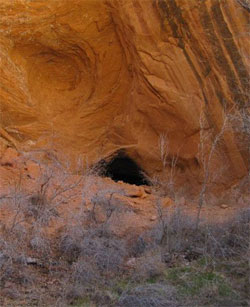 A certain Dorothy J. Gordin spent the night of 26th December 1938 here, in this cave and she wrote her name on the blackened wall back then. Before her, there were Mormon pioneers, Spanish conquistadors, Navajo Indians who passed through that cave and so on, going back to the first cavemen who found refuge in the cave of Daniel Suelo. Waiting for others to join him as well, he is the first one who took water from the spring in the vale, the first who sheltered from the wind behind the rock wall, who lied down on the dusty ground to get some rest, who felt insignificant at the base of the dizzying heights, who contemplated the crimson rocks in the sun, who lived with scorpions, with pumas and the raccoons.
A certain Dorothy J. Gordin spent the night of 26th December 1938 here, in this cave and she wrote her name on the blackened wall back then. Before her, there were Mormon pioneers, Spanish conquistadors, Navajo Indians who passed through that cave and so on, going back to the first cavemen who found refuge in the cave of Daniel Suelo. Waiting for others to join him as well, he is the first one who took water from the spring in the vale, the first who sheltered from the wind behind the rock wall, who lied down on the dusty ground to get some rest, who felt insignificant at the base of the dizzying heights, who contemplated the crimson rocks in the sun, who lived with scorpions, with pumas and the raccoons.
In the canyon, it is only the inhabitants of the cave who pass by. Daniel Suelo would have been the perfect host if he hadn’t forgotten his pocket knife. It’s half past three, the night is already closing in and there’s a keen cold at “his place”. With no tools, preparation for sleep is complicated, all the more so as the stores of Moab (Utah) are within one hour, walking distance. These stores are filled with all sorts of camping supplies, since Americans are fond of all sorts of gadgets that allow them to have inside their tents the exact same comfort they have in their houses. But our man is inventive.
He packed with him a series of plastic tools and after lighting up a spectacular camp fire, he started to cook dinner. The vegetables that were picked up one day before were a bit shriveled – just like the cheese and the clementines he had for desert – from the dumpster of a supermarket. The result was a warm consistent soup – a genuine feast. Our host’s first lesson: “Since I don’t want anything else than what is accessible here and now, I am living a life filled with abundance.”
Daniel Suelo applies this principle in every aspect of his existence and in order to survive, he is only relying on what society and nature (or, in other words, his lucky star) provide. In other words, he does not buy or sell, he does not make any kind of barter and he refuses any kind of help from social services. From the fall of 2000 when one day he voluntarily left his last dollars in a phone booth in Pennsylvania, Daniel Suelo lives with no money. He talks about that moment like it was a detox: “I just gave up a bad habit, just like a junkie gives up on drugs. Money is the cause of a feeling of absence. They keep us tied to the past, through our debt and they always tie us to the future, through our future payments, thus stopping us to properly honor the present moment.”
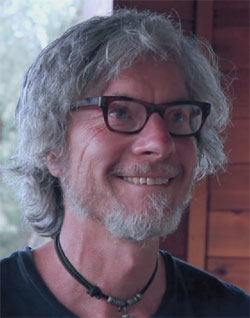 At a first glance, Daniel Suelo is not different from the great mass of creeps who live on the edge of pathology and the American dream. But in the case of Suelo, this became an epic story from the moment when Mark Sundeen turned him into the hero for his book: “The man who gave up money”, in which the author questions the American model of economy. Published in 2012, in the United States, the book became rapidly famous, especially for the puritan Americans, whose beliefs were shattered by the financial crisis of 2008. “The most striking thing about Daniel is his intellectual honesty. I have never seen him violating his principles”, Mark Sundeen confesses. He also discovered him as a “charismatic speaker” during a series of lectures held by the two after the book was published.
At a first glance, Daniel Suelo is not different from the great mass of creeps who live on the edge of pathology and the American dream. But in the case of Suelo, this became an epic story from the moment when Mark Sundeen turned him into the hero for his book: “The man who gave up money”, in which the author questions the American model of economy. Published in 2012, in the United States, the book became rapidly famous, especially for the puritan Americans, whose beliefs were shattered by the financial crisis of 2008. “The most striking thing about Daniel is his intellectual honesty. I have never seen him violating his principles”, Mark Sundeen confesses. He also discovered him as a “charismatic speaker” during a series of lectures held by the two after the book was published.
Fully transformed by this lifestyle, Daniel Suelo spends a lot of time at the Moab library where he has free wi-fi and thus is able to write on his blog and answer the thousands of e-mails he receives from the admirers who wish to follow his path, together with the frustrated ones who argue that he undermines the system and especially from the curious who want to know how can he live without a penny in his pocket. As he tells us, things are pretty simple: “I freely take what is being given freely to me, by nature or by other human beings. I eat wild plants and whatever I can find in the dumpsters. Sometimes I eat at the friends who invite me to dinner. I fish and I hunt. I even ate animals crushed by cars on the highway. However, only when they are fresh.”
Sleeping is not an issue either, even if he feels best in the cave close to Moab. However, the hardest test of detachment from the world is physical pain. Actually, the only time when he “gave in” and he denounced his principles was when he had a cut at one of his fingers as he was working. Upon the advice of his sister he eventually went to the ER. The few stitches cost several hundred dollars and he was forced to find a temporary job in order to be able to pay his debt. This episode, he claims, strengthened his beliefs even more. Now, for instance, when he feels a tooth ache, he simply puts pine needles inside his cavity. “After stuffing it with needles, my tooth broke in half but at least it stopped aching.”
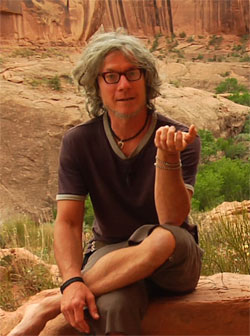 Asceticism is the privilege of the great mystics. From John the Baptist of the Gospels, to the sadhu beggars from India, mystics have understood that all excesses of this world end up by suffocating the soul. However, Suelo has nothing of the image of a thin hermit. He did not even set out to be abstinent. His abstinence is rather related to his lifestyle. It is interesting to see how he crosses rivers barefoot, walking through ice-cold water, and yet he does not even blink while the visitors shiver only by looking at him.
Asceticism is the privilege of the great mystics. From John the Baptist of the Gospels, to the sadhu beggars from India, mystics have understood that all excesses of this world end up by suffocating the soul. However, Suelo has nothing of the image of a thin hermit. He did not even set out to be abstinent. His abstinence is rather related to his lifestyle. It is interesting to see how he crosses rivers barefoot, walking through ice-cold water, and yet he does not even blink while the visitors shiver only by looking at him.
Daniel Suelo is also a prophet of a sort. With a solid background in Christianity, Buddhism, Islam, Taoism, Native American culture and Shamanism as well as anthropology, his religion can be summed up as: money is a fake idol. He ensures those who are willing to listen to him: “Money only exists if there are enough people to believe in its existence. It is not a physical reality but a belief, an illusion. If we separate ourselves from this illusion, we can realize that the hundred dollar bill is nothing but a piece of paper with a drawing on it”.
Useless to mention, such a speech pronounced in the country that made property rights the basis of its national principles is unimaginable. Just one example: Suelo’s case meant nothing for the forestry employee who fined him 120 dollars for “illegal cave occupation”, although at the time, he lived in the canyon. The fine was eventually converted into 20 hours of community work because the offender was in insolvency. As for the police officers, they rarely hide their suspicion regarding this homeless who hitch-hikes or is caught dumpster diving. “I tell the cops that I visit America by foot, Suelo explains. It moves them. Many of them are patriots, they have been in the army and they perfectly understand the fact that every citizen should have the right to travel freely in his own country.”
Had he not been so tolerant and contemplative, by fostering such ideas, Daniel Suelo could have become a great revolutionary. However, he chose the Christian approach of teaching the word of Jesus, which is under no circumstance surprising from someone coming from a family of fervent believers, where the Bible is taken literally. True Christians, Daniel’s parents willingly received everyone who comes to meet them, in their cozy home in Fruita, a peaceful town in Colorado. They end their phrases with the “glory to the Lord”, the famous words we can hear from the born again Christians and embrace their son with love.
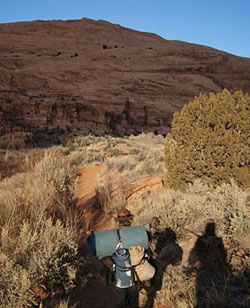 Up until he went to college, he was a fervent Christian himself. However, during a humanitarian mission in Ecuador, when he was twenty five, all his aspirations regarding a peaceful life were shattered. The young man, so naïve at that time, became fully aware of religious hypocrisy, of the American economic imperialism and of the damage caused by consumerism. A long depression ensued, followed by an attempted suicide when he turned 30. He jumped off a cliff in his car and he got away alive as if by magic. After that, he resigned his job as a social worker and starting crossing America by bike, on foot, hitch-hiking or simply as a stowaway on freight trains. He learned how to manage, he discovered community life and counter-culture. He gradually turned into a hobo, a homeless that, from the likes of Huckleberry Finn to Jack London and Jack Kerouac, inspires the American imagination.
Up until he went to college, he was a fervent Christian himself. However, during a humanitarian mission in Ecuador, when he was twenty five, all his aspirations regarding a peaceful life were shattered. The young man, so naïve at that time, became fully aware of religious hypocrisy, of the American economic imperialism and of the damage caused by consumerism. A long depression ensued, followed by an attempted suicide when he turned 30. He jumped off a cliff in his car and he got away alive as if by magic. After that, he resigned his job as a social worker and starting crossing America by bike, on foot, hitch-hiking or simply as a stowaway on freight trains. He learned how to manage, he discovered community life and counter-culture. He gradually turned into a hobo, a homeless that, from the likes of Huckleberry Finn to Jack London and Jack Kerouac, inspires the American imagination.
The final transformation occurred in 1999, during a trip to Thailand and India, where he was initiated in transcendental meditation and realized that renunciation is a form of richness. Upon his return from Asia, he voluntarily gave away the last money he had. He had not intended it but he gave way to a very powerful urge that seized him at the gas station near the place where he had found shelter. He understood that the fifty dollar bill he had hidden deep down his pockets “just in case” was not the solution to his problems but on the contrary, their very cause. So he bought an envelope, put twenty dollars inside – the equivalent of a fine, his last debt – and the rest of the money, he left it in a phone booth.
Mark Sundeen describes this decisive step: “Suelo turned around, went across the parking lot and left his last money there, behind him. That moment, it started to rain. But Suelo had the powerful feeling that on his face, a liquid was pouring denser and warmer than honey, caressing his hair, his face and shoulders. He was seized with ecstasy, embraced by divine grace and by the love that supports everything in the universe. Forgive us our debts, cut the knot of all attachments and remove us from this vicious circle… Once this baptism was accomplished when he stopped trembling with emotion, he knew he had done the right thing.”
“I now feel the urge to share this message to the world. I feel I have a volcano inside of me, waiting to erupt”, Suelo says while drinking a cup of coffee he received on the house in the hotel lobby.
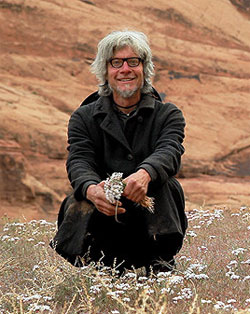 Daniel is a balanced, educated and austere man and at the same time, very nice. Who wouldn’t want to help him, impressed with the honesty he shows in everything he does? At Moab, a former mining city turned into a Mecca of mountain biking, he became aware of well known character, enjoying the help of the community. Had he done drugs, had he been drinking or simply had he been a hobo of the street, what would have been his chances of survival? In other words, Daniel Suelo’s experience is Daniel Suelo’s experience.
Daniel is a balanced, educated and austere man and at the same time, very nice. Who wouldn’t want to help him, impressed with the honesty he shows in everything he does? At Moab, a former mining city turned into a Mecca of mountain biking, he became aware of well known character, enjoying the help of the community. Had he done drugs, had he been drinking or simply had he been a hobo of the street, what would have been his chances of survival? In other words, Daniel Suelo’s experience is Daniel Suelo’s experience.
He is often reminded of it and he nods thinking of the failure of the Moneyless Tribe. Last summer, upon request of several disciples he met on the Internet, he accepted to be the leader of a nomadic community that would leave according to his principles of a free life. However, the group of approximately six-seven people did not last long, undermined by the egotism of some of the members and by the actual inability of some to truly let go of money for good. He recalls sadly: “Even the most fervent from them hid away a few dollars for their phone bill. They couldn’t imagine life without Facebook!”
Also during the time of his “liberation” from money, Daniel also got free of his last name, Shellabarger, choosing another one that would remind him of what truly supports his existence: the earth, suelo in Spanish.
yogaesoteric
June 2015
Also available in:
 Română
Română
